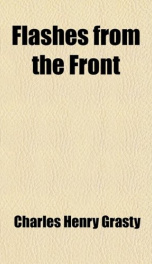flashes from the front

Purchase of this book includes free trial access to www.million-books.com where you can read more than a million books for free. This is an OCR edition with typos. Excerpt from book: FLASHES FROM THE FRONT CHAPTER I Exit Asquith: Enter Lloyd George December, 1916. The cabinet crisis has brought into the foreground a figure always interesting in America, the king. The present king is much underrated outside of England. Physique has much to do with personality, and King George is small and delicate, as his father was robust and large. George is shy; Edward was a man of the world. But those who know the former describe him as a man of great vigor and an expert in diplomacy. He possesses a minute knowledge of international relations. For example, I am told that he knows all about and takes a keen interest in the relations between the United States and Mexico. A democratic country entertains an unfailing curiosity about a monarch. What influence has the English king in the present situation, and what is he permitted to do? Is he a factor to be reckonedwith? Would King Edward VII, if alive to-day, have been a real factor in the situation? I have taken some pains to try to learn from people who ought to know what the facts are, but the simple truth is that nobody, not even King George himself, possesses accurate information. The King of England is in a twilight zone between old law and custom and new. For example, he possesses certain legal or constitutional powers of veto, but no English king has used these for four hundrefJ years. The king received Mr. Asquith's resignation and sent for Mr. Bonar Law to form a new ministry. When Mr. Law declined, the king sent for Mr. Lloyd George, who accepted, succeeded in the task, and, going back to the king, "kissed hands," which put the stamp of conclusion on the job. All these proceedings were treated with the utmost seriousness by press and public, as if the king were an autocratic sovereign. The...
Info about the book
Author:
Series:
Unknown
ASIN:
069113992X
Rating:
3/5 (5)Your rating:
0/5
Languge:
English
Users who have this book
Users who want this book
What readers are saying
What do you think? Write your own comment on this book!
write a commentif you like flashes from the front try:
Other books by this author
Do you want to exchange books? It’s EASY!
Get registered and find other users who want to give their favourite books to good hands!


